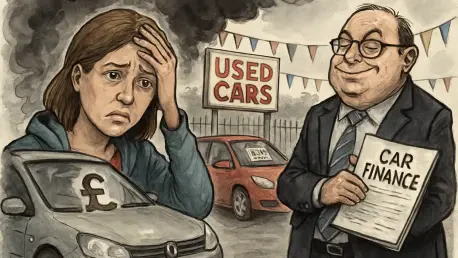I’m thrilled to sit down with Priya Jaiswal, a distinguished expert in banking, business, and finance, whose deep knowledge of market analysis and international trends offers invaluable insights into the complexities of the financial sector. Today, we’re diving into the recent motor finance mis-selling scandal involving Lloyds Banking Group in the UK, a controversy that has rocked the industry with billions in provisions and regulatory challenges. Our conversation will explore the roots of this issue, the financial implications for Lloyds and other lenders, the role of the Financial Conduct Authority (FCA), and the broader impact on the banking landscape. Let’s unpack this intricate story and understand what it means for consumers and the market.
Can you walk us through the core of the motor finance mis-selling scandal involving Lloyds and other banks?
Absolutely. At its heart, this scandal revolves around the way motor finance loans were sold to customers, often with hidden or unfair commission structures. Banks like Lloyds were involved in arrangements where dealers received commissions for pushing higher interest rates on car loans, without properly disclosing this to borrowers. This lack of transparency meant customers were often paying more than they should have, without understanding why. It’s a breach of trust that dates back to 2007, affecting a huge number of people who financed vehicles during that period.
How have customers been impacted by these practices in the motor finance sector?
The impact on customers has been significant. Many were saddled with loans that carried unnecessarily high interest rates, costing them hundreds or even thousands of pounds more over the life of the loan. Beyond the financial hit, there’s also the emotional toll—feeling misled or taken advantage of by institutions they trusted. This has eroded confidence in the banking sector, and now, with compensation schemes in play, some are finally seeing a chance for redress, though the process can be long and complex.
Lloyds has now set aside a staggering 1.95 billion pounds for this issue. How did they determine this amount?
Lloyds initially reserved about 1.15 billion pounds based on early estimates of affected customers and potential payouts. The additional 800 million pounds came after the FCA’s proposed redress scheme suggested a wider scope of eligible cases and potentially higher compensation per person than anticipated. They’ve had to reassess the scale of historical loans dating back nearly two decades, factoring in not just direct losses but also the FCA’s broader approach to fairness, which pushed their total provision up to 1.95 billion pounds.
How does Lloyds’ provision compare with what other banks are setting aside for similar mis-selling issues?
While Lloyds is one of the largest players in motor finance and thus has a hefty provision, other banks are also feeling the strain. For instance, smaller lenders like Close Brothers have signaled they’ll need to reserve more funds, though their amounts are smaller due to their market share. The FCA estimates the total cost across all lenders could hit 11 billion pounds, so Lloyds’ nearly 2 billion is a significant chunk but still just a fraction of the industry-wide burden. It shows how widespread this issue is across the sector.
The FCA has put forward a redress scheme for affected consumers. Can you explain what this scheme entails?
The FCA’s redress scheme is designed to compensate customers who were mis-sold motor finance loans, focusing on those impacted by unfair commission practices. It outlines a framework for identifying eligible cases—going back to 2007—and calculating payouts. The scheme prioritizes fairness over strict financial loss, meaning some customers might receive more than they directly overpaid. It’s a structured way to address a massive volume of claims, but it’s also sparked debate over how compensation is determined.
What’s behind Lloyds’ concern that the FCA’s approach might result in higher payouts than initially expected?
Lloyds is worried because the FCA’s methodology for calculating compensation isn’t as tied to actual customer losses as they had hoped. Instead, it seems to lean on broader principles of unfairness, which could mean larger payouts per case. For example, even if a customer’s financial loss was minimal, the redress might factor in the ethical breach, inflating the amount. Lloyds sees this as potentially overcompensating and is gearing up to challenge the regulator on these grounds.
Speaking of that challenge, what specific issues does Lloyds have with the FCA’s compensation calculations?
Lloyds’ main gripe is that the FCA’s formula doesn’t closely align with measurable financial harm to customers. They argue it’s too subjective, incorporating elements of perceived unfairness that are harder to quantify. This disconnect could lead to payouts that exceed what Lloyds modeled in their provisions, and they’re pushing for a methodology that sticks more closely to documented overpayments or direct losses rather than broader ethical considerations.
Do you think Lloyds’ challenge to the FCA could significantly alter the final payout amount?
It’s possible, but not guaranteed. If Lloyds and other lenders successfully persuade the FCA to adjust the redress scheme—perhaps by tying compensation more directly to proven losses—the total payout could be lower than projected. However, the FCA is under pressure to prioritize consumer protection, so they might resist major changes. This tug-of-war could drag on, and the outcome will likely set a precedent for how similar scandals are handled in the future.
With the FCA estimating an industry-wide cost of 11 billion pounds, how is this scandal affecting the broader banking sector?
This is a massive hit to the industry, especially for banks heavily involved in motor finance. It’s not just about the financial burden—though 11 billion pounds is no small figure—but also the reputational damage. Smaller banks like Close Brothers are under pressure too, as they scramble to set aside funds while managing thinner profit margins. For the sector as a whole, it’s a wake-up call about transparency and fair practices, and it’s likely to strain balance sheets for years as claims are processed.
Could this scandal lead to lasting changes in how motor finance is regulated in the UK?
Absolutely, I think it’s inevitable. Scandals of this scale often trigger tighter regulations, and we could see stricter rules around commission structures, mandatory disclosures, and oversight of dealer-lender relationships in motor finance. The FCA might also push for more proactive monitoring to catch issues before they balloon into billion-pound problems. For consumers, this could mean fairer deals down the line, but for lenders, it’ll likely mean higher compliance costs and slimmer margins.
Interestingly, Lloyds’ stock price rose by 1.6% after announcing the increased provision. What do you think drove that market reaction?
It’s a bit counterintuitive, but the market seemed to breathe a sigh of relief that the additional 800 million pounds wasn’t as steep as feared. Last week, when Lloyds flagged a “material” hike in provisions, investors braced for a much larger number. The 1.6% uptick suggests that traders view this 1.95 billion total as manageable for a bank of Lloyds’ size. It also hints at confidence that the worst of the uncertainty might be priced in, at least for now.
What’s your forecast for the long-term impact of this scandal on Lloyds and the motor finance industry?
I think Lloyds will weather this storm financially—they’re a major player with deep pockets—but the reputational damage will take longer to repair. They’ll need to rebuild trust with consumers while navigating tighter regulations. For the motor finance industry as a whole, I foresee a shift toward greater transparency and stricter oversight, which could reshape how loans are structured and sold. The 11 billion pound hit across lenders will sting, and smaller firms might struggle more than giants like Lloyds. Ultimately, this could be a turning point, forcing the sector to prioritize fairness over profit in a way we haven’t seen before.









